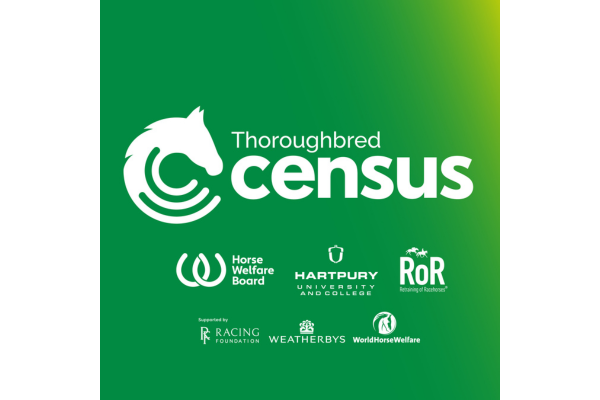


27 Mar 2024
Details of 8,256* former racehorses were submitted by their owners during Britain’s first-ever Thoroughbred Census, 5,566 of which were previously unrecorded.
The six-month census was launched last year by British racing’s Horse Welfare Board (HWB) and funded by the Racing Foundation as part of its 3-year, £3 million grant supporting a number of HWB projects, of which the census is one.
The census was also supported by Retraining of Racehorses, World Horse Welfare and Weatherbys Stud Book.
A key aim of the Thoroughbred Census was to help bridge the intelligence gap between the current estimate of the British Thoroughbred population and the reality and was undertaken by equine research experts at Hartpury University.
The data, obtained following independent analysis by the university, will enable British racing and its aftercare charity, RoR, to better support owners as well as continue to build informed and helpful communities.
The university has now sized the former racehorse population at 33,600**. When the new Census data is combined with information from the 13,000 members of RoR plus data from equestrian associations, the intelligence bank on former racehorses residing in Great Britain now covers 80%*** of the estimated population.
The HWB was established in 2019 and is responsible for overseeing the single overarching strategy for equine welfare in the racing industry.
Helena Flynn, Programme Director, HWB, said: “The Thoroughbred Census represents an important milestone in British racing’s commitment to improve the traceability of all former racehorses after they leave the sport.
“It also enriches our intelligence about what these horses go on to do.
“It is often misperceived that Thoroughbreds who are not successful in racing are discarded as they are unable to adapt to other roles; however, the Census results showcase their incredible versatility and their ability to thrive in a host of new careers.”
Thoroughbreds engage in wide and varied activities after racing, such as dressage (11%), showjumping (8%), and eventing (8%), while the majority are enjoyed for leisure riding, hacking, and unaffiliated competing (36%).
The range of activities is broad and reflects how well a racing career prepares Thoroughbreds for other disciplines, with almost as many moving into equine-assisted activities, such as therapy, as those moving into endurance riding.
While there was strong participation from people connected to racing, the Census identified gaps in contributions from wider equestrian communities and disciplines.
As a result, the HWB, in collaboration with RoR, is now developing tailored plans to better connect with these underrepresented groups and will work with equestrian member bodies and associations to ensure any knowledge gaps continue to reduce.
For more information about the census, contact Gabi Whitfield, Head of Welfare Communications, Great British Racing and Horse Welfare Board, at [email protected]
——————————————————————————————————————-
*8,256 horses taken forward for analysis representing the UK non-racing Thoroughbred population at a margin of error of ±1% at the 99% confidence interval.
**Across the last 20 years, an average of 4,900 Thoroughbred foals are born per annum (Weatherbys Fact Book data: 2003-2023), with on average 21,814 horses in training per year (average of BHA horses in training data: 2024-2011) and assuming an equivalent number of yearlings to foals are within the industry, there are an estimated 31,614 horses actively engaged in the racing industry per year. RoR estimate that 7,000 Thoroughbreds leave racing per year, of which 40% (n=2800) enter retraining for their second careers. Census data has identified the average age of former racehorses residing in Britain is 12±5 years, enabling an informed estimate of the current former racehorse population resident in the UK: UK former racehorse population based on average age of Thoroughbred owned: 33,600 horses.
***Based on the estimated UK former racehorse population of 33,600.